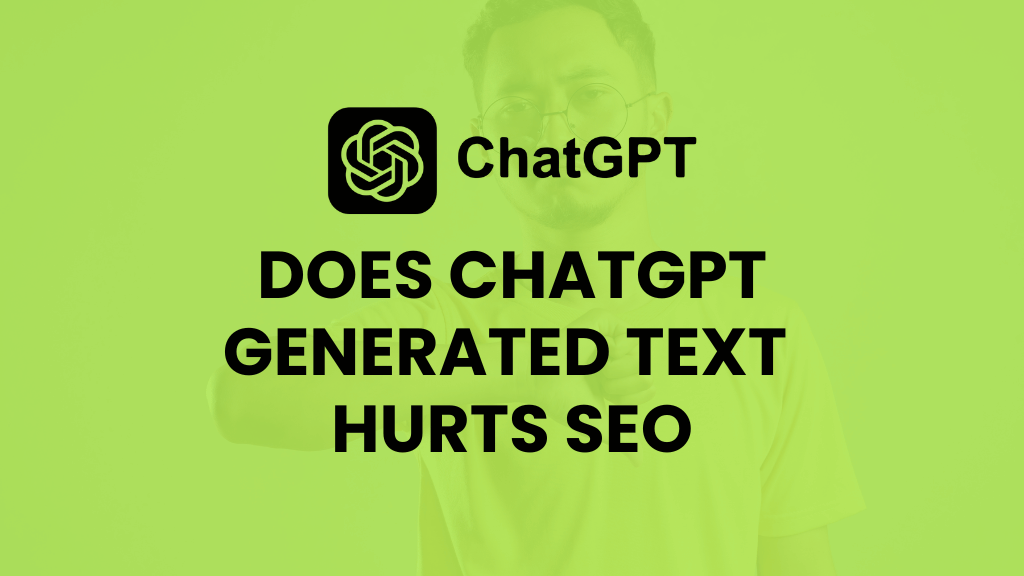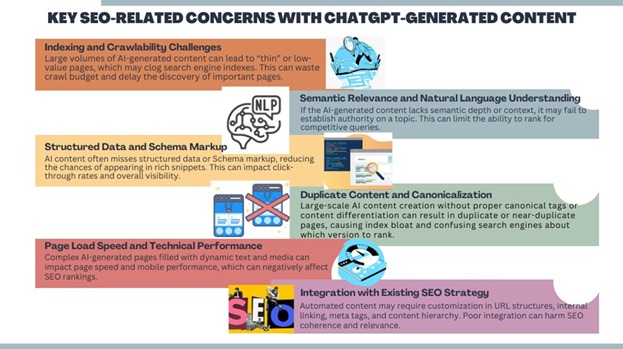In recent years, AI-powered tools like ChatGPT have revolutionized content creation. They promise faster writing, endless ideas, and even keyword optimization, all at the click of a button. But for website owners and SEO specialists, a burning question remains: Does ChatGPT-generated text hurt your SEO?
This article dives deep into this question. We’ll explore what ChatGPT content is, how Google views AI-generated text, potential SEO risks and benefits, detection possibilities, and practical tips for using ChatGPT wisely to enhance your website’s performance, not damage it.
ChatGPT and the Power of AI-Generated Content
ChatGPT is a language model developed by OpenAI, designed to generate human-like text based on the prompts it receives. It uses deep learning techniques and massive datasets to produce coherent, relevant content on a wide range of topics. For website owners, marketers, and bloggers, ChatGPT can:
- Create blog drafts and outlines.
- Write product descriptions.
- Generate FAQs and meta descriptions.
- Assist with content ideation.
Google’s Stance on AI-Generated Content
Google’s official position on AI-generated content has evolved alongside advancements in AI technology. While Google’s algorithms don’t inherently penalize AI-written text, the quality and usefulness of the content are what truly matter. In Google’s own words from the Google Search Central Blog, content should primarily help users, be original, and demonstrate expertise, authoritativeness, and trustworthiness — summarized by the acronym E-E-A-T (Experience, Expertise, Authoritativeness, Trustworthiness). Google’s key messages are:
- AI-generated content is allowed if it is helpful and not spammy.
- Low-quality, auto-generated, or “thin” content that offers little value can be penalized.
- Focus on user intent and content quality, not on how the content was created.
Key SEO-Related Concerns with ChatGPT-Generated Content
Many website owners worry that ChatGPT content might negatively affect their SEO rankings due to several issues:
1. Indexing and Crawlability Challenges
AI-generated content might be deployed at scale, resulting in large volumes of pages. Without a strategic approach, this can create thin or low-value pages that clog search engine indexes. Search engines might then crawl these less-important pages excessively, wasting crawl budget and delaying discovery of high-priority content.
2. Semantic Relevance and Natural Language Understanding
Modern search engines increasingly rely on natural language processing (NLP) and semantic search to understand content context. If ChatGPT-generated content lacks semantic depth or includes loosely related keywords, it might fail to establish topical authority, limiting its ability to rank for competitive queries.
3. Structured Data and Schema Markup
Automated content generation often overlooks the inclusion of structured data (Schema.org markup), which helps search engines understand page elements like FAQs, reviews, or articles. Absence of proper markup reduces chances of rich snippets, which are critical for click-through rates (CTR) and enhanced visibility.
4. Duplicate Content and Canonicalization
While not always a direct AI issue, large-scale AI content production without proper canonical tags or content differentiation risks creating duplicate or near-duplicate pages. This can cause index bloat and confuse search engines about which version to rank.
5. Page Load Speed and Technical Performance
When AI-generated content leads to large, complex pages filled with dynamically generated text and media, it can impact site speed and mobile performance. Poor technical performance negatively affects SEO rankings, as page experience metrics become more important.
6. Integration with Existing SEO Strategy
ChatGPT content often needs customization to fit an existing SEO framework, including URL structures, internal linking, meta tags, and content hierarchy. Automated content that is not well integrated can weaken a site’s overall SEO coherence and topical relevance.
Pros and Cons of Using AI-Generated Content
Find the clear advantages and pitfalls of using AI-generated content.
Pros
- Speeds up content creation
- Helps with keyword optimization May lack originality and a unique voice
- Enables scalable content production
- Cost-effective compared to manual writing
- Useful for content ideation and drafts
Cons
- Risk of generic or thin content
- May lack originality and a unique voice
- Potential for factual inaccuracies
- Potential for factual inaccuracies
Best Practices for Using ChatGPT Content Without Hurting Your SEO
If you decide to use ChatGPT’s content for your website content, follow these best practices to protect and boost your AI SEO content:
1. Prioritize Human Review and Editing
AI can draft impressive text quickly, but it lacks nuanced understanding and critical thinking. Always have an experienced content editor or SEO specialist review and revise AI-generated content to:
- Verify factual accuracy and update any outdated information.
- Adjust tone, style, and voice to match your brand identity.
- Add unique insights, examples, and expert opinions that AI cannot generate.
- Refine keyword placement for natural readability and SEO impact.
This step ensures your content is both high-quality and authentic, key factors for search engines and users alike.
2. Use AI Content as a Starting Point, Not the Final Product
Treat ChatGPT outputs as drafts, outlines, or idea generators rather than finished articles. For example:
- Generate a blog outline or section headers using ChatGPT.
- Produce rough drafts of FAQs, intros, or meta descriptions.
- Brainstorm alternative phrasings or keyword variations.
Then, expand on these foundations with in-depth research, original analysis, and personalized storytelling to create rich, authoritative content.
3. Align Content Closely with User Intent
Ensure the AI-generated content aligns with the specific search intent behind your target keywords, whether informational, transactional, navigational, or commercial investigation. To do this:
- Analyze top-ranking competitor pages for the same keywords.
- Adjust the AI text to answer the exact questions users have.
- Incorporate clear calls to action (CTAs) where appropriate.
- Provide comprehensive, actionable information that satisfies user needs fully.
Meeting user intent reduces bounce rates and signals to Google that your page deserves a high ranking.
4. Enhance Content with SEO Fundamentals
Don’t neglect traditional SEO elements just because the content was AI-generated. Optimize your pages by:
- Crafting compelling, keyword-rich titles and meta descriptions.
- Structuring content with proper heading tags (H1, H2, H3).
- Using descriptive and keyword-relevant URLs.
- Implementing internal linking to related pages.
Adding alt text to images. - Ensuring mobile-friendliness and fast page load speeds.
These technical optimizations complement the written content to maximize SEO potential.
5. Focus on E-E-A-T (Experience, Expertise, Authoritativeness, Trustworthiness)
Google’s quality raters emphasize E-E-A-T as a critical ranking factor. You can boost these signals by:
- Showcasing author credentials or expert contributors.
Adding personal stories or case studies that demonstrate experience. - Linking to reputable sources to back up claims.
- Encouraging user reviews or testimonials on product/service pages.
Incorporate these elements alongside AI-generated text to reinforce credibility and user trust.
6. Avoid Keyword Stuffing and Over-Optimization
AI models can sometimes generate repetitive or unnatural keyword usage. To prevent this:
- Use keyword density tools to monitor frequency.
- Rewrite or remove awkward keyword placements.
- Prioritize semantic keywords and related phrases instead of exact match stuffing.
- Maintain natural, conversational language that flows smoothly for readers.
A well-optimized but natural-sounding text will rank better and keep users engaged.
7. Incorporate Rich Media and Interactive Elements
Text alone isn’t enough for modern SEO. Improve user engagement and content depth by adding:
- Images, infographics, and charts that explain or support your points.
- Videos or audio clips for richer storytelling.
- Interactive features such as quizzes, polls, or calculators.
- Structured data markup (Schema) for FAQs, reviews, and articles.
These elements improve user experience, increase time on page, and enhance search result listings with rich snippets.
8. Regularly Audit and Update AI-Generated Content
Search engines favor fresh and accurate content. Establish a content maintenance plan that includes:
- Periodic reviews to verify information accuracy.
- Updating keywords to reflect evolving search trends.
- Adding new insights or removing outdated sections.
- Monitoring user engagement metrics and adjusting accordingly.
Keeping AI content current ensures it remains relevant and competitive in search rankings.
9. Monitor Performance and Adjust Strategy
Use SEO analytics tools like Google Search Console, Ahrefs, or SEMrush to track how your AI-generated content performs. Look at:
- Organic traffic trends.
- Keyword rankings and impressions.
- Bounce rate and average session duration.
- Click-through rate (CTR) from search results.
Use these insights to refine your prompts, content topics, and editing approach — continually improving your AI-powered content strategy.
Can Google Detect ChatGPT Content?
Google has sophisticated algorithms designed to assess content quality and user value, but there’s no public evidence that Google explicitly penalizes AI-generated content just because it’s AI-written.
Some third-party AI detection tools exist to identify AI text patterns, but these tools are not foolproof. Moreover, detection does not equal penalty. What matters is whether the content meets Google’s quality guidelines.
Google likely evaluates AI content through these signals:
- Repetitive or unnatural phrasing.
- Lack of depth or original insights.
- Poor engagement metrics (high bounce rate, low dwell time).
- Duplicate or scraped content patterns.
So, instead of fearing detection, focus on producing valuable, well-edited, and user-focused content.
FAQs
Yes, ChatGPT-generated content can rank on Google if it meets quality standards, provides real value to users, and adheres to SEO best practices. The key is to use AI as a tool rather than a crutch and ensure human oversight.
AI-generated text itself is not automatically considered duplicate. However, if the content closely mirrors existing pages or lacks uniqueness, it can be flagged for duplication. Proper editing and customization reduce this risk.
Google penalizes low-quality, spammy, or thin content, not AI-generated content per se. If your AI-written content is helpful, original, and well-structured, it should not incur penalties.
Wrapping It All Up
ChatGPT and AI-generated text are powerful tools that can help accelerate your content creation and SEO efforts, but only if used wisely. The biggest SEO risk is not that your content is AI-written, but that it might be low-quality, unoriginal, or poorly optimized.
Don’t let uncertainty hold you back from leveraging the power of ChatGPT and AI-driven content creation. Whether you need expertly crafted, SEO-optimized content or guidance on integrating AI tools effectively, we’re here to help.
Contact us today for a personalized consultation and discover how to safely and successfully use AI-generated content to elevate your website’s rankings and grow your online presence!



